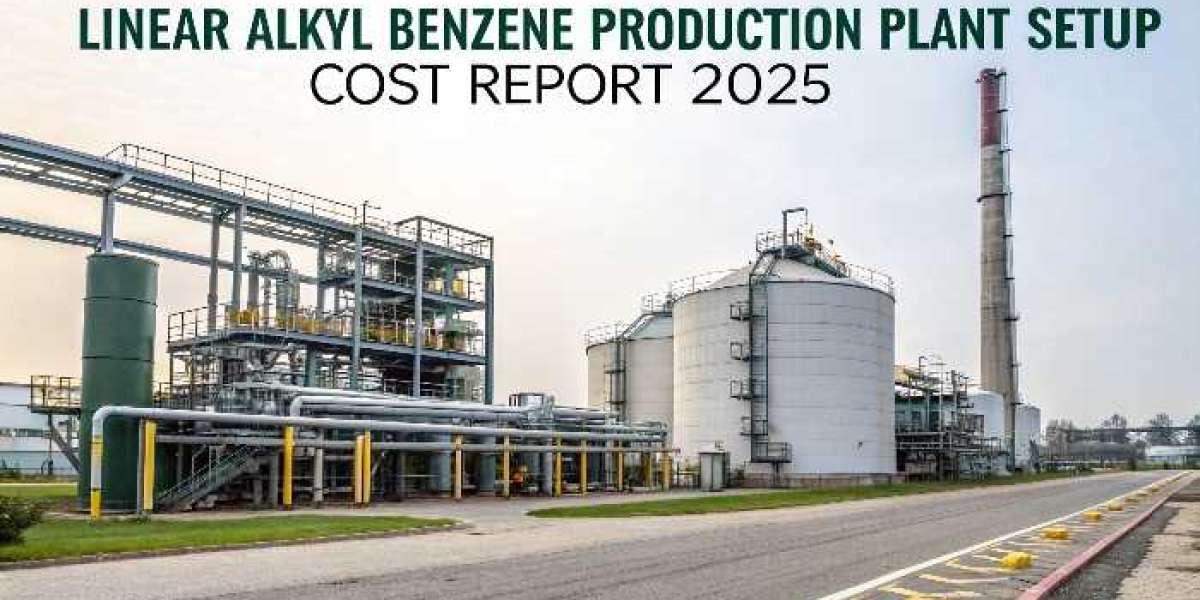Comprehensive Guide to Setting Up a Linear Alkyl Benzene Production Plant:
IMARC Group’s Linear Alkyl Benzene Production Plant Project Report 2025 provides an in-depth roadmap for establishing a linear alkyl benzene (LAB) production plant, encompassing a detailed assessment of project economics—including linear alkyl benzene (LAB) production plant expenditure projections, capital investment, project funding, operating costs, income and expenditure projections, cost structure, profit margins, and ROI. This report serves as a practical guide for entrepreneurs, investors, and industry professionals, offering critical insights into plant setup requirements, technology selection, raw material sourcing, infrastructure planning, manpower needs, and market opportunities.
What is Linear Alkyl Benzene and how is it produced?
Linear alkyl benzene (LAB) is a crucial organic compound primarily used in manufacturing linear alkylbenzene sulfonate (LAS), a key ingredient in biodegradable detergents and cleaning products. The production process typically involves the alkylation of benzene with linear mono-olefins derived from kerosene or paraffin feedstock using hydrogen fluoride (HF) or solid acid catalysts. LAB offers excellent surfactant properties, high solubility, and environmental compatibility, making it a preferred raw material in the detergent and cleaning industry.
Key Insights for Linear Alkyl Benzene Production Plant Setup:
Detailed Process Flow: Unit Operations and Quality Standards-
• Unit Operations
• Quality Assurance
• Technical Tests
• Raw Material Requirements
The manufacturing process involves feed preparation, dehydrogenation, alkylation, separation, and purification. Quality assurance focuses on maintaining precise alkyl chain distribution, low bromine index, and high purity levels. Common feedstocks include kerosene, n-paraffins, and benzene, all of which require strict quality control to ensure consistent product output.
Land, Location, and Site Development-
• Selection Criteria
• Site Development
• Environmental Impact
• Land Requirement and Costs
The plant should be located in an industrial zone with access to petrochemical feedstock suppliers, transportation networks, and utilities like water, steam, and electricity. Environmental compliance is essential, particularly concerning emissions and waste management associated with HF-based processes. Depending on production capacity, the land requirement typically ranges between 10,000 to 20,000 square meters.
Plant Layout: Importance and Influencing Factors-
• Designated Zones
• Layout Efficiency
• Operational Benefits
A well-designed layout ensures streamlined material flow from feed preparation to product storage. Dedicated zones for process units, utilities, control rooms, and safety systems enhance operational safety and efficiency. Proper layout planning also allows for future expansion and automation integration.
Plant Machinery: Requirements and Costs-
• Essential Equipment
• Cost Considerations
• Supplier Support
Major machinery includes alkylation reactors, dehydrogenation units, heat exchangers, distillation columns, separators, and storage tanks. The cost of equipment depends on production capacity and process technology (HF or solid catalyst). Leading suppliers offer integrated systems with emission control and high process efficiency.
Raw Materials: Procurement and Costs-
• Feedstock Options
• Procurement Strategy
• Cost Factors
Primary raw materials include benzene, kerosene-derived n-paraffins, and catalysts. Securing long-term supply contracts from refineries and chemical distributors ensures cost stability. Feedstock quality significantly affects overall plant efficiency and product yield, making procurement strategy a key factor in cost optimization.
Packaging: Requirements and Suppliers-
• Packaging Materials
• Procurement Needs
• Cost and Compliance
Linear alkyl benzene is typically packaged in bulk containers, drums, or tankers, depending on client needs. Packaging must meet chemical safety and transportation regulations. Reliable suppliers provide corrosion-resistant containers and compliance documentation for safe handling.
Other Requirements and Costs-
• Transportation
• Utilities
• Energy and Water
• Human Resources
Significant utilities include steam, cooling water, process air, and electricity. Efficient energy management is critical due to the high-temperature processes involved. Skilled engineers, chemists, and operators are essential for maintaining quality control and operational efficiency.
Project Economics: Costs and Profitability-
• Capital Investment
• Operating Costs
• Revenue and Margins
The Linear Alkyl Benzene Production Plant cost comprises land acquisition, civil construction, process machinery, and working capital. Operating expenses include raw materials, energy, labor, and maintenance. With rising demand for biodegradable detergents, LAB production offers robust margins and steady growth prospects.
Financial Analysis: Investment Returns and Risk Assessment-
• Performance Metrics
• Return on Investment
• Risk Factors
Financial indicators such as ROI, IRR, NPV, and payback period are used to evaluate project feasibility. Key risks include feedstock price fluctuations, environmental compliance costs, and technological changes in surfactant production. A well-structured financial model ensures sustainable profitability.
Other Analysis Covered: Market Trends and Strategic Insights-
• Market Trends
• Segmentation
• Regulatory Environment
• Case Studies
The global LAB market is expanding due to the growing demand for eco-friendly detergents, industrial cleaners, and household care products. Regional segmentation highlights strong growth in Asia-Pacific driven by urbanization and rising hygiene awareness. Regulatory standards emphasize safety, biodegradability, and emission control.
Ask An Analyst: https://www.imarcgroup.com/request?type=reportid=22822flag=C
Conclusion
Setting up a Linear Alkyl Benzene Production Plant is a lucrative investment, supported by rising global demand for sustainable surfactants. With robust process technology, efficient plant design, and strong supply chain management, entrepreneurs can achieve high returns and long-term business stability.
About Us:
IMARC is a global market research company offering comprehensive services to support businesses at every stage of growth, including market entry, competitive intelligence, procurement research, regulatory approvals, factory setup, company incorporation, and recruitment. Specializing in factory setup solutions, we provide detailed financial cost modelling to assess the feasibility and financial viability of establishing new manufacturing plants globally. Our models cover capital expenditure (CAPEX) for land acquisition, infrastructure, and equipment installation while also evaluating factory layout and design's impact on operational efficiency, energy use, and productivity. Our holistic approach offers valuable insights into industry trends, competitor strategies, and emerging technologies, enabling businesses to optimize operations, control costs, and drive long-term growth.
Contact Us:
IMARC Group
134 N 4th St. Brooklyn, NY 11249, USA
Email: sales@imarcgroup.com
Tel No:(D) +91 120 433 0800
United States: (+1-201971-6302)








